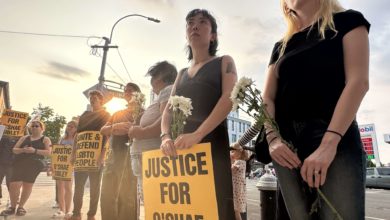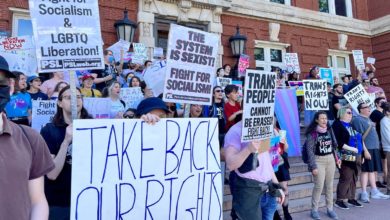 March for marriage equality, San Francisco, Aug. 4 Photo: Bill Hackwell |
California’s Proposition 8 was
overturned in U.S. Federal Court Aug. 4 as unconstitutional. Proposition 8 is
the voter referendum that narrowly passed in 2008 prohibiting same-sex marriages by
altering the California state constitution.
Earlier in 2008, the California
Supreme Court had ruled that same-sex couples be afforded the right to marry.
Same-sex marriage rights are recognized in several U.S. states and many
countries around the world.
This victory was tempered by a
temporary stay that was issued preventing the immediate resumption of same-sex marriages
in the state. A certain appeal to the Ninth Circuit of the U. S. Court of Appeals
and likely to the Supreme Court may ultimately decide the legal issue.
However, it is clear that today’s
ruling is the result of militant struggle in the streets throughout California
and around the country in favor of marriage equality and against bigotry
towards lesbian, gay, bisexual and trans people. In reality, this outcome
stands firmly on the shoulders of victories galvanized by the civil rights and
women’s liberation movements.
In his unequivocal ruling overturning Prop. 8, federal
Judge Vaughn R. Walker in Perry v. Schwarzenegger cites the history of marriage in the United States and the forward
march of social progress in relation to the institution. Referencing the 1967
Supreme Court ruling in Loving v. Virginia, he stated, “Race restrictions on marital partners were once common in
most states but are now seen as archaic, shameful or even bizarre”—a direct
result of the civil rights movement of the time.
Further he states: “The marital bargain in California
(along with other states) traditionally required that a woman’s legal and
economic identity be subsumed by her husband’s upon marriage … this
once-unquestioned aspect of marriage now is regarded as antithetical to the
notion of marriage as a union of equals.” This formal equality was won through
the struggle of the women’s rights movement.
The decision also paints a picture of marriage in the
future: “The evidence shows that the movement of marriage away from a gendered
institution and toward an institution free from state-mandated gender roles
reflects an evolution in the understanding of gender rather than a change in
marriage.”
While today’s ruling firmly advances the struggle for
same-sex marriage equality and LGBT rights in general, it will take an expanded
people’s movement in the streets to bring an end to racism and the inequality
of women and LGBT people. Only socialism can fully eradicate the economic basis
for the existence of such discrimination.
Thousands of people took to the streets in Los Angeles,
San Francisco and other cities throughout California in celebration and
preparation for a continued struggle as the decision is challenged in the
courts. The Party for Socialism and Liberation joined in these marches and
rallies, handing out a statement from PSL electoral candidates. These
candidates include Carlos Alvarez, an openly gay candidate for governor,
Marylou Cabral for secretary of state and Gloria La Riva for Congress.
In part the statement reads, “It is the pressure of the
mass movement for same-sex marriage rights that pushed back the right wing and
strengthened the court case against Proposition 8.” It continues: “The PSL
campaigns continue to demand federally recognized same-sex marriage rights …
and demands an end to the discriminatory “Don’t Ask Don’t Tell” policy of the
Pentagon and more funding for HIV/AIDS.
Along with same-sex marriage rights, the LGBT community
needs an inclusive Employment Non-Discrimination Act, currently stalled in
Congress.






